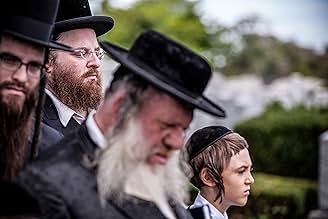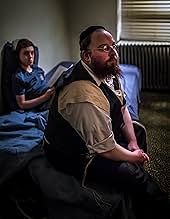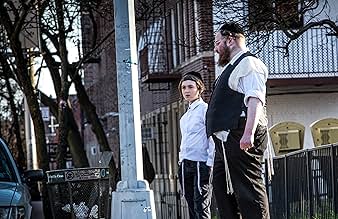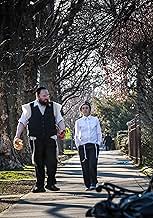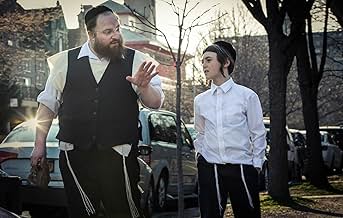IMDb रेटिंग
6.6/10
2.7 हज़ार
आपकी रेटिंग
अपनी भाषा में प्लॉट जोड़ेंWithin Brooklyn's ultra-orthodox Jewish community, a widower battles for custody of his son. A tender drama performed entirely in Yiddish, the film intimately explores the nature of faith an... सभी पढ़ेंWithin Brooklyn's ultra-orthodox Jewish community, a widower battles for custody of his son. A tender drama performed entirely in Yiddish, the film intimately explores the nature of faith and the price of parenthood.Within Brooklyn's ultra-orthodox Jewish community, a widower battles for custody of his son. A tender drama performed entirely in Yiddish, the film intimately explores the nature of faith and the price of parenthood.
- पुरस्कार
- 7 जीत और कुल 18 नामांकन
Meir Ber Schwartz
- The Ruv
- (as Meyer Schwartz)
Melissa Weisz
- Bayla
- (वॉइस)
फ़ीचर्ड समीक्षाएं
Menashe is an authentic, emotional masterpiece telling the story of a kind, hapless, Hasidic grocery store clerk who battles to keep his family together after his wife dies. Directed by Joshua Z. Weinstein and starring Menashe Lustig, the film was shot clandestinely because of the beliefs of the Orthodox Jewish sect. I love this film because it took willpower to make. You can't say that about many films nowadays.
Menashe is about a kindhearted, but miserable grocery store employee that must remarry in order to care for his only son. It is against the Hasidic beliefs that a child be taken care of without a mother in the home. While Menashe ponders his situation, his well-off brother-in-law is given custody of Rieven by their Rabbi. Menashe is frustrated by this and is only able to get back custody of his son for a week, while he looks for a new wife. It doesn't seem that he really wants to get remarried, because when he goes on one date he isn't particularly friendly.
Unlike the rest of his family and friends, Menashe is more at ease with the secular society surrounding them in Brooklyn. He dresses more casually, without the requisite black hat and coat. While he takes his religion seriously, he wants to embrace life and freedom, more than the sect allows. My favorite part of this film is when Menashe drinks malt liquor with the Hispanic employees after his late night shift. They talk about life and try to get Menashe back on track.
One of the attributes of this film is the way it educates you about the culture of ultra Orthodox Judaism. The other very impressive fact is that it is the first film in 70 years to be filmed in Yiddish. Most of the film is subtitled for those who don't speak Yiddish. Both Menashe Lustig and young Ruben Niborski convey the closeness they have between father and son. One downside of the film is that it is low budget, which is reflected in its grainy resolution. Some of that could also be due to the fact that it was shot in secret.
I give this film 4 out of 5 stars for its authenticity and emotional punch. I recommend it for ages 13 through 18. The film is in limited release throughout the country at art house cinemas.
Reviewed by Clayton P., KIDS FIRST! Film Critic.
Menashe is about a kindhearted, but miserable grocery store employee that must remarry in order to care for his only son. It is against the Hasidic beliefs that a child be taken care of without a mother in the home. While Menashe ponders his situation, his well-off brother-in-law is given custody of Rieven by their Rabbi. Menashe is frustrated by this and is only able to get back custody of his son for a week, while he looks for a new wife. It doesn't seem that he really wants to get remarried, because when he goes on one date he isn't particularly friendly.
Unlike the rest of his family and friends, Menashe is more at ease with the secular society surrounding them in Brooklyn. He dresses more casually, without the requisite black hat and coat. While he takes his religion seriously, he wants to embrace life and freedom, more than the sect allows. My favorite part of this film is when Menashe drinks malt liquor with the Hispanic employees after his late night shift. They talk about life and try to get Menashe back on track.
One of the attributes of this film is the way it educates you about the culture of ultra Orthodox Judaism. The other very impressive fact is that it is the first film in 70 years to be filmed in Yiddish. Most of the film is subtitled for those who don't speak Yiddish. Both Menashe Lustig and young Ruben Niborski convey the closeness they have between father and son. One downside of the film is that it is low budget, which is reflected in its grainy resolution. Some of that could also be due to the fact that it was shot in secret.
I give this film 4 out of 5 stars for its authenticity and emotional punch. I recommend it for ages 13 through 18. The film is in limited release throughout the country at art house cinemas.
Reviewed by Clayton P., KIDS FIRST! Film Critic.
Struggle is something that is universal. Adversity doesn't care who you are, where you have come from, or even who you know. Granted, it can be relative, but no matter who you are, road blocks are still road blocks. Documentarian and first-time narrative director Joshua Z. Weinstein takes this theme but looks at it from a different direction with "Menashe," featured at this year's Dallas International Film Festival and now getting a wider release.
The title character is played by Menashe Lustig and is a widower who is just trying to get by in his ultra-orthodox Jewish community. He is still mourning the loss of his wife a year later while constantly chasing his bills working at a local Jewish market, and he is also dealing with the fact that he does not have custody of his son, Rieven (Ruben Nidorski) due to his religious beliefs that children must be raised in a two-parent household. Until he remarries, Rieven has to live with his brother, Eizik (Yoel Weisshaus), and his family. Menashe has always been seen as the lesser of his siblings, so he embarks on a journey of self-discovery and responsibility just to try for a normal life.
Weinstein takes his documentary-style of filming (with no score and a lot of steady-cam shots) and applies it here, which gives it an intimate feel that really enhanced my emotional investment into his story (which he also co-wrote with Alex Lipschultz). In my comments to our vendor after the screening, I used the phrase "both heartbreaking and heartwarming," and this is the best way I can describe "Menashe". Lustig plays the lead character in a way that even though his struggles are specific to a demographic, there are themes of independence, responsibility, and family that each and every one of us can identify with and feel for him during. His work with Nidorski is very organic, and it works on every level. Almost the entire film is translated from Yiddish, but as real and powerful as this story is, the subtitling bothered me even less than it normally does.
It is true that this film may not be seen as "for everyone" due to the community that it takes place in, but I fully and whole-heartedly disagree. Its universal themes are presented in a way that its context is well-explained so that the audience can see why the traditions are what they are. Much like "Donovan" earlier this year, "Menashe" is an independent film that tells its story in an honest and grounded way that deserves to be seen by as large of an audience as possible.
The title character is played by Menashe Lustig and is a widower who is just trying to get by in his ultra-orthodox Jewish community. He is still mourning the loss of his wife a year later while constantly chasing his bills working at a local Jewish market, and he is also dealing with the fact that he does not have custody of his son, Rieven (Ruben Nidorski) due to his religious beliefs that children must be raised in a two-parent household. Until he remarries, Rieven has to live with his brother, Eizik (Yoel Weisshaus), and his family. Menashe has always been seen as the lesser of his siblings, so he embarks on a journey of self-discovery and responsibility just to try for a normal life.
Weinstein takes his documentary-style of filming (with no score and a lot of steady-cam shots) and applies it here, which gives it an intimate feel that really enhanced my emotional investment into his story (which he also co-wrote with Alex Lipschultz). In my comments to our vendor after the screening, I used the phrase "both heartbreaking and heartwarming," and this is the best way I can describe "Menashe". Lustig plays the lead character in a way that even though his struggles are specific to a demographic, there are themes of independence, responsibility, and family that each and every one of us can identify with and feel for him during. His work with Nidorski is very organic, and it works on every level. Almost the entire film is translated from Yiddish, but as real and powerful as this story is, the subtitling bothered me even less than it normally does.
It is true that this film may not be seen as "for everyone" due to the community that it takes place in, but I fully and whole-heartedly disagree. Its universal themes are presented in a way that its context is well-explained so that the audience can see why the traditions are what they are. Much like "Donovan" earlier this year, "Menashe" is an independent film that tells its story in an honest and grounded way that deserves to be seen by as large of an audience as possible.
The price tag on fatherhood soars when tradition knocks on your door. Orthodoxy antagonizes the downtrodden, and fortune is monopolized by the most religious adherents. Yiddish mumbles separate father from son. Songs of lament ring through thin apartment walls. The rambunctious laughter of Menashe's child is limited to sidewalk engagements.
Employee of the month every month, Menashe is invaluable to his dictatorial boss at the borough's cultural specific grocery front. This distinction is not established by Menashe's work ethic, but rather by his attention to detail. With Hispanic co-workers, his Hasidic sensibilities garner favor with his Jewish supervisor. Menashe truly desires the best for the customers, and even if the man in charge cannot accommodate, the sentiment is appreciated with stern denials.
Approaching a year since the most bitter sweet loss of his self- contained life, Menashe is finally heeding his Rabbi's instructions, albeit halfheartedly. He submits to uncomfortable appointments in hopes of restoring a household. He is attempting to regain one person, by courting another.
His book speaks of man's inadequacy void of a woman. The Torah crafts a tale of interdependence, and his leadership point at passages to bolster his grief. The community cares for his son above him, and he cares for his son above all else. The walls of domesticity have tumbled, and he is the remaining survivor in Jericho.
A man cannot be expected to run a home and a livelihood, Menashe is reminded by his financially obese brother-in-law. The division in duties is divinely appointed, and Menashe's spiritual juggling can be blamed for his misfortune. His orthodoxy begins to slip. His coat and hat creep out of his closet, and he studies haphazardly.
What Menashe lacks in observance, he corrects with compassion. He is zealous but in an unconventional manner. He mimics his creator when he horses around with his only child. The abandon and whimsy of Menashe infects the boy, and together they create a fuller home than any other formal nuclear family. The uncompromising devotion to one's offspring might just rewrite thousands of years of tradition.
Employee of the month every month, Menashe is invaluable to his dictatorial boss at the borough's cultural specific grocery front. This distinction is not established by Menashe's work ethic, but rather by his attention to detail. With Hispanic co-workers, his Hasidic sensibilities garner favor with his Jewish supervisor. Menashe truly desires the best for the customers, and even if the man in charge cannot accommodate, the sentiment is appreciated with stern denials.
Approaching a year since the most bitter sweet loss of his self- contained life, Menashe is finally heeding his Rabbi's instructions, albeit halfheartedly. He submits to uncomfortable appointments in hopes of restoring a household. He is attempting to regain one person, by courting another.
His book speaks of man's inadequacy void of a woman. The Torah crafts a tale of interdependence, and his leadership point at passages to bolster his grief. The community cares for his son above him, and he cares for his son above all else. The walls of domesticity have tumbled, and he is the remaining survivor in Jericho.
A man cannot be expected to run a home and a livelihood, Menashe is reminded by his financially obese brother-in-law. The division in duties is divinely appointed, and Menashe's spiritual juggling can be blamed for his misfortune. His orthodoxy begins to slip. His coat and hat creep out of his closet, and he studies haphazardly.
What Menashe lacks in observance, he corrects with compassion. He is zealous but in an unconventional manner. He mimics his creator when he horses around with his only child. The abandon and whimsy of Menashe infects the boy, and together they create a fuller home than any other formal nuclear family. The uncompromising devotion to one's offspring might just rewrite thousands of years of tradition.
"Menashe" is a semi-documentary, reflecting the case of Menashe Lustig, the actor performed the main character. A film about laws of an ultra conservative community, about parenthood and about life. And , sure, about vulnerable people. Touching and delicate and precise, the work of Menashe Lustig is just admirable. He is the film and I admitt, I saw me reflected in his beautiful portrait of the single father , lost across the challenges, naive and man of good intentions, prisoner of his life. So, a gem . A real special one because it is not a lesson but a confession, honest at whole.
This quiet drama portrays the scuffling life of a man within the Hasidic community in Brooklyn as he endeavors to regain custody of his son in the aftermath of his wife's passing. He is expected to find a new wife and achieve stability as he holds down a low-paying, labor-intensive job as a grocery clerk that drains him of his time and his spirit. He has difficulty keeping his own modest life in order, let alone being strong enough to provide for another human being.
His efforts to better himself in order to regain custody of his son are met with dismissal from those around him, including his more devout and financially stable brother-in-law whom the community has decided should look after the man's son. He gets little encouragement from those within his community, yet he persists.
There is a considerable schism within the Hasidic community that comes to light in this film, especially on account of the man's less-than-pious lifestyle and more secular demeanor. He doesn't readily embrace the hard-line teachings of his sect as forcefully as his peers, but he nevertheless wants what's best for his son and wants to fulfill the requirements of his denomination in order to remain a real father. In that regard, this is an exceptional portrayal of loyalty to one's religious faith in the face of ongoing personal conflict. It's definitely not for many viewers who wouldn't relate to religious doctrine as a deciding force in one's life, but it's still a story that's effectively conveyed and devoid of proselytizing. Recommended to open-minded viewers.
His efforts to better himself in order to regain custody of his son are met with dismissal from those around him, including his more devout and financially stable brother-in-law whom the community has decided should look after the man's son. He gets little encouragement from those within his community, yet he persists.
There is a considerable schism within the Hasidic community that comes to light in this film, especially on account of the man's less-than-pious lifestyle and more secular demeanor. He doesn't readily embrace the hard-line teachings of his sect as forcefully as his peers, but he nevertheless wants what's best for his son and wants to fulfill the requirements of his denomination in order to remain a real father. In that regard, this is an exceptional portrayal of loyalty to one's religious faith in the face of ongoing personal conflict. It's definitely not for many viewers who wouldn't relate to religious doctrine as a deciding force in one's life, but it's still a story that's effectively conveyed and devoid of proselytizing. Recommended to open-minded viewers.
क्या आपको पता है
- ट्रिवियाDirector Joshua Z Weinstein, who is neither a member of a Haredi community nor a speaker of Yiddish, used a translator on set.
- साउंडट्रैकIvdu Es Hashem Mit Simcha
Written and performed by Michoel Schnitzler
Courtesy of Michoel Schnitzler
टॉप पसंद
रेटिंग देने के लिए साइन-इन करें और वैयक्तिकृत सुझावों के लिए वॉचलिस्ट करें
- How long is Menashe?Alexa द्वारा संचालित
विवरण
- रिलीज़ की तारीख़
- कंट्री ऑफ़ ओरिजिन
- आधिकारिक साइट
- भाषाएं
- इस रूप में भी जाना जाता है
- 我和我的不完美老爸
- फ़िल्माने की जगहें
- उत्पादन कंपनियां
- IMDbPro पर और कंपनी क्रेडिट देखें
बॉक्स ऑफ़िस
- US और कनाडा में सकल
- $17,03,036
- US और कनाडा में पहले सप्ताह में कुल कमाई
- $62,078
- 30 जुल॰ 2017
- दुनिया भर में सकल
- $19,62,265
- चलने की अवधि
- 1 घं 22 मि(82 min)
- रंग
- ध्वनि मिश्रण
- पक्ष अनुपात
- 2.00 : 1
इस पेज में योगदान दें
किसी बदलाव का सुझाव दें या अनुपलब्ध कॉन्टेंट जोड़ें





